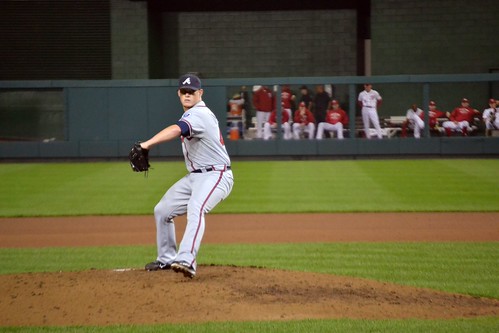Bullpen overwork catching up with Phillies in journey through the desert
Kimbrel #Kimbrel

PHOENIX — Attrition was going to come for the Phillies’ bullpen one way or the other by Saturday in Phoenix. The workload of the previous two days, and the fact that it had resulted in precisely zero wins, only exacerbated the matter.
Commonplace as three games in three days may be for regular-season baseball, the intensity of the postseason variety is without comparison. So both Arizona and Philadelphia approach Saturday’s Game 5 of the National League Championship Series with four high-leverage relievers having worked – and worked under pressure – each of the previous two games.
Dutifully and to a man, Jose Alvarado, Jeff Hoffman, Craig Kimbrel and Orion Kerkering reported themselves available minutes after Friday’s 6-5 loss in Game 4. The veracity of those claims will be tested in the steamy desert light of afternoon in a series that is suddenly tied at two games apiece.
“We’ll check in with them tomorrow and see how many guys we’ve got available,” manager Rob Thomson said Friday night. “We’re certainly not going to put people in jeopardy, but this is a tough group, and they want to play.”
The scorecard over Thursday and Friday:
• Hoffman: seven outs recorded over 34 pitches, with one hit (and an inherited runner) allowed.
• Kerkering: one out on 21 pitches against five base-runners.
• Alvarado: seven outs recorded in 21 pitches.
• Kimbrel: three outs, four earned runs and 45 pitches, every last one agita-inducing.
Hoffman and Kerkering worked Tuesday, so they’ve thrown the dreaded three times in four days, which Thomson strenuously avoids. Four in five is very much unfavorable (and in the case of Kerkering, about unfathomable). Alvarado worked back-to-back days three times in September. Given his arm troubles and the fact that Thomson already wanted to avoid him Friday, he’s almost certainly unavailable. And the general interest level in seeing Kimbrel pitch again is so low it’s burrowing into the earth’s outer crust.
All of which points to a bigger problem this postseason: The Phillies are effectively working with an 11-man pitching staff. Michael Lorenzen has pitched once, to close out a 10-2 win. Taijuan Walker hasn’t even gotten that, for a 15-game winner in the first year of a $72 million contract.
Both are apparently being kept back for emergencies, just not the kind of emergencies the Phillies have so far faced. (Lorenzen was warming for the ninth in Game 5 had the Phillies tied it against Arizona closer Paul Sewald.)
“Well, both those guys are the length guys really. That’s how I see it,” Thomson said. “And Taijuan is really ready for extra innings if we need it or early in the game if we get down or we have a big lead. And kind of the same thing with Lorenzen.”
The only bright side is that Arizona is in a similar predicament, with Sewald, Ryan Thompson, Andrew Saalfrank and Kevin Ginkel having pitched back-to-back days. (Having 16 pitchers wear out a path from the bullpen will shockingly create these issues.) The D’backs at least have two series-evening wins to show for their efforts.
That shifts the burden to two starters who understand the task. Zac Gallen was second in MLB with 210 innings pitched this year. Zack Wheeler was tied for 12th with 192, though in two fewer starts.
• • •
To the surprise of no one, Thomson offered full-throated votes of confidence in Kerkering and Kimbrel.
The diagnosis of problems was less straightforward.
On Kimbrel: “Just strike-throwing ability and being able to command his pitches.” Thomson at least conceded that “we have to talk about” Kimbrel’s postseason role.
On Kerkering: “He’s just struggled the last couple of nights, but I still have faith in him too. Tonight maybe he got sped up a little bit. I don’t know. You know, he wasn’t the only one. I mean, we have to throw strikes. Those guys have great stuff. They have to throw it through the zone.”
Thomson and J.T. Realmuto hit on the central issue afflicting both: The evaporation of first-pitch strikes.
Kimbrel started one of six batters with strikes. Gregory Soto, who also allowed two baserunners against just one out in his first action in eight days, was one for three. Kerkering didn’t throw a first-pitch strike. (It’s not everything: He was 3-for-3 in giving up three hits in Game 3.)
“That’s the difference in the last two games to the first two games,” Realmuto said. “We were turning our 0-2, 1-2 counts in the first two, and now they’re 3-1, 2-0 counts. That’s how you turn good hitters into great hitters. That’s what it was tonight. We just fell behind too much and weren’t attacking the strike zone.”
Being behind the eight ball in the pitch-clock era means precious few moments to regroup. Hence rushing and a lack of control of the moment, which turns into a lack of control of pitches, which restarts the whole cycle.
“A lot of our pitchers looked sped up to me,” Realmuto said. “That’s what happens when you fall behind in counts and the place gets loud, you start feeling the crowd and the atmosphere. It’s the same thing our crowd does at our place.”